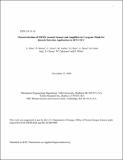Characterization of MEMS Acoustic Sensors and Amplifiers in Cryogenic Fluids for Quench Detection Applications in HTS CICC
Author(s)
Zhoa, Z.; Moore, P.; Owen, C.; Anilus, M.; Chau, S.; Desai, A.; Emerling, M.; Chiesa, L.; Takayasu, Makoto; White, R.; ... Show more Show less
Download21ja061_full.pdf (2.748Mb)
Metadata
Show full item recordAbstract
An acoustic quench detection method utilizing MEMS (Micro Electro-Mechanical System) acoustic sensors is proposed. To investigate this method, a commercially available MEMS pie-zoelectric microphone, the Vesper VM1000, and two types of second stage amplifiers, using either an OPA344 or a LMH6629 based amplifier circuit, were characterized at cryo-genic temperatures in helium gas. The MEMS microphones were in their original package with an integrated preamplifier. The tests were performed inside a two-stage Gifford-McMahon cryocooler from room temperature down to 60 K, at static pressures between 1.2 and 1.4 bar in gaseous helium, over the frequency band from 100 Hz to 10 kHz. Second stage amplifiers were needed to achieve signal to noise ratios approaching the manufacturer specified operating levels. The OPA344 based amplifier reduced in gain by >55 dB below 230 K, while the LMH6629 based amplifier performed well down to 60 K. The MEMS microphones appear to perform acoustic measure-ments down to 165 K but with some reduction in sensitivity down to 60 K. An acoustic model of the cryocooler plane wave tube calibration setup is developed and used to calibrate the microphone despite the presence of a significant thermal gradients down the plane wave tube.
Description
Submitted for publication in IEEE Transactions on Applied Superconductivity
Date issued
2020-11Department
Massachusetts Institute of Technology. Plasma Science and Fusion CenterJournal
IEEE Transactions on Applied Superconductivity
Publisher
IEEE
Other identifiers
21ja061